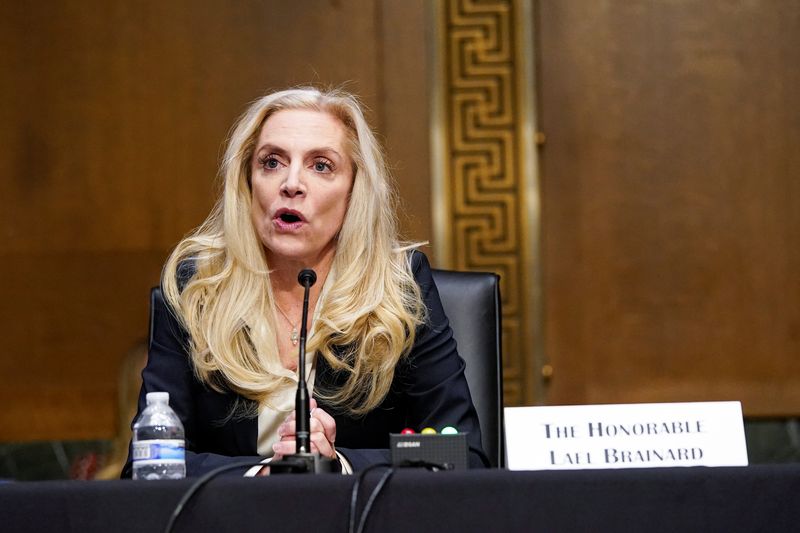By Howard Schneider and Ann Saphir
CHICAGO (Reuters) -The U.S. Federal Reserve is clear on the need for restrictive monetary policy to lower inflation, Fed Vice Chair Lael Brainard said on Monday, but the path and pace of rate increases will remain "data-dependent" as the central bank monitors the economy and the evolution of domestic and global risks.
In prepared remarks and responses to questions, Brainard said Fed rate hikes to date were beginning to slow the economy - perhaps even more than expected - and that the full brunt of tighter policy would not even be felt for months to come.
Additionally, the "concurrent" rate hikes by central banks abroad as they all fight local outbreaks of inflation was creating an impact "larger than the sum of its parts" that posed potential risks U.S. officials need to monitor, Brainard said.
"There is clarity that monetary policy will be restrictive for some time, until there is confidence inflation comes down. ... The (Federal Open Market) Committee has said policy rates will increase further," Brainard said. But "we also will be learning as we go and that assessment will reflect incoming data and also risks domestically and globally ... The actual policy path will be data-dependent."
She referred to projections of policymakers about the path of interest rates, which as of September showed the median officials anticipating the federal funds rate rising to around 4.6% next year, as "very helpful at a point in time," but also based on expectations about how the economy will evolve.
"Things can change," she said.
Brainard gave no sense the Fed was weakening in its resolve to quell inflation that is currently triple the central bank's 2% target, or that the Fed will not proceed with planned rate increases including a possible three-quarter point hike at its Nov. 1-2 session.
In an appearance at a National Association for Business Economics conference, she restated that it would be risky for the Fed to back off "prematurely" in its rate tightening, and that it would "take some time" for inflation to fall.
However she spoke at a time of mounting external concern that the speed of Fed rate increases was stressing the global economy and had outrun the central bank's ability to monitor the impact it was having.
In a poll of 45 professional forecasters conducted by the NABE, a little over half said that "the greatest downside risk to the U.S. economic outlook is too much monetary tightness."
Fed officials have for the most part discounted those concerns, acknowledging the risks of over-tightening but also saying they need to get the target federal funds rate to a level they feel will bring inflation under control by restraining the economy.
The Fed has raised rates rapidly this year, using three-quarter point increments of late to bring the target federal funds rate to a range between 3% and 3.25%.
In separate remarks at the NABE event, Chicago Fed President Charles Evans said incoming data would have to "rock" policymakers' economic projections to throw officials off the 4.6% rate they have penciled in for next year.
"We're headed for this four and a half percent-ish federal funds rate by March," Evans said, with little time left for data to shift officials' views.
Like Evans, Brainard laid out some of the dynamics she thought might help bring inflation down while leaving the U.S. job market and economy intact.
Brainard said for example that in retail and other industries there was "ample room for margin recompression" - in effect lower business profits - to bring down the price of goods, along with further improvements in supply chains and hiring.
But she also emphasized some of the evolving risks, including possible stress in financial markets and what could be a faster than expected slowdown in the United States.
"Output has decelerated so far this year by more than anticipated," in sectors like housing that are directly influenced by borrowing costs, Brainard said.

There are indications as well that U.S. consumers have spent down household balances faster than previously estimated, a possible signal of slowed consumer spending to come, she said.
Globally, "uncertainty remains high," Brainard said, noting that a sharp shift in risk sentiment "could be amplified, especially given fragile liquidity in core financial markets."